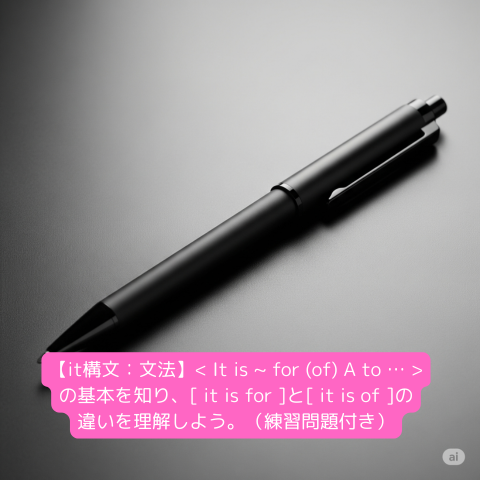< It is ~ for (of) A to … >の基本について知ろう
「it is for」は、文脈によってさまざまな意味を持つ非常に便利な英語表現です。基本的には「何かの目的や用途、あるいは誰かの利益や責任」を示す際に使われます。
「it is for」の主な使い方
1. 目的・用途(〜のためです、〜用です)
これは最も一般的な使い方で、ある物事が何のために存在するのか、あるいは何に使われるのかを示します。
- 例文:
- This pen is for writing.
- このペンは書くためのものです。
- This room is for meetings.
- この部屋は会議用です。
- What is this button for?
- このボタンはなんのためですか?
- The new law is for public safety.
- 新しい法律は公共の安全のためです。
- This pen is for writing.
2. 対象者・受益者(〜のためのものです、〜向けです)
ある物事が誰のために用意されたのか、誰がそれから恩恵を受けるのかを示します。
- 例文:
- This present is for you.
- このプレゼントはあなたのためのものです。
- The event is for children under 10.
- そのイベントは10歳以下の子ども向けです。
- It’s not for everyone.
- それは誰にでも向けられたものではありません。(万人に通用するものではない)
- This present is for you.
3. 担当・責任・義務(〜の役目です、〜の責任です)
ある行動や判断が誰の責任であるか、誰がそれを行うべきかを示します。特に「It is for + 人 + to do…」の形でよく使われます。
- 例文:
- It is for the judge to decide.
- それは裁判官が決定すべきことです。
- It’s not for me to say.
- それは私が言うべきことではありません。
- The decision is for the team leader.
- その決定はチームリーダーの責任です。
- It is for the judge to decide.
4. 期間・継続(〜間です)
期間を表す「for」の用法で、特に応答で使われます。
- 例文:
- “How long is the warranty for?” “It’s for one year.”
- 「保証期間はどのくらいですか?」「1年間です。」
- “How long is the warranty for?” “It’s for one year.”
その他の関連表現
- It’s for the best.
- それが最善です/そうする方がいいでしょう。
- (たとえ今は辛くても)結果的にはそれが一番良い、という意味で使われます。
- It’s not for nothing.
- それは無駄ではない/それには理由がある。
- 努力が無駄ではないことや、何らかの目的や理由があることを示唆します。
「it is for」はシンプルな形ですが、文脈によって意味が大きく変わるため、前後の文脈をしっかり捉えることが重要です。
it is for と it is ofの違いを知ろう
「it is for」と「it is of」の最も重要な違いは、主にIt is + 形容詞 + (for / of) + 人 + to do... という構文で現れます。この構文では、形容詞が「何」を修飾しているかによって「for」と「of」を使い分けます。

It is for を使う場合
It is + (形容詞) + for + 人 + to do... の形で使われる場合、「人が~するのは…だ(人にとって~である)」という意味になります。
ポイント:
- 形容詞が「to do」の部分(行動)を修飾している場合に使います。
- 形容詞は、行動の性質(難しい、簡単、重要など)を表します。
for + 人は、その行動を行う人(不定詞の意味上の主語)を示します。
例文:
- It is difficult for me to understand.
- 私が理解するのは難しい。
- (難しいのは「私」ではなく、「理解する」という行為です。)
- 形容詞
difficultは、to understandという行為の難しさを表しています。
- It is important for us to learn English.
- 私たちが英語を学ぶのは重要だ。
- (重要なのは「私たち」ではなく、「英語を学ぶ」という行為です。)
- 形容詞
importantは、to learn Englishという行為の重要性を表しています。
- It is easy for him to solve the problem.
- 彼がその問題を解くのは簡単だ。
- (簡単なのは「彼」ではなく、「問題を解く」という行為です。)
It is of を使う場合
It is + (形容詞) + of + 人 + to do... の形で使われる場合、「~するなんて、人は…だ」という意味になります。
ポイント:
- 形容詞が「to do」を行う「人」の性質や評価を表す場合に使います。
- 形容詞は、人の性格や特徴(親切な、賢い、愚かな、注意深い、不注意ななど)を表します。
of + 人は、その行動を行った人の性質や評価を示します。
of を伴う形容詞の例: kind, nice, good, clever, wise, foolish, stupid, careless, polite, rude, generous, cruel, thoughtful, selfish など。
例文:
- It is kind of you to help me.
- 私を助けてくれるなんて、あなたは親切だ。
- (親切なのは「助ける」という行為ではなく、助けてくれた「あなた」という人の性質です。)
- 形容詞
kindは、youの性質を表しています。
- It is foolish of him to make such a mistake.
- そんな間違いをするなんて、彼は愚かだ。
- (愚かなのは「間違いをする」という行為ではなく、間違いをした「彼」という人の性質です。)
- It was clever of her to find the answer so quickly.
- そんなに早く答えを見つけるなんて、彼女は賢かった。
- (賢かったのは「答えを見つけた」という行為ではなく、答えを見つけた「彼女」という人の性質です。)
まとめ
| 構文 | 形容詞が修飾するもの | 意味 | 形容詞の例 |
|---|---|---|---|
| It is ~ for + 人 + to do | to do (行動) | 人が~するのは…だ(人にとって~である) | difficult, important, easy, hard, necessary, possible |
| It is ~ of + 人 + to do | 人 (行動する人) | ~するなんて人は…だ | kind, nice, foolish, clever, careless, polite |
「it is for」と「it is of」に関する練習問題

セクション1:英文和訳(Translate the following English sentences into Japanese.)
- It is easy for him to speak English.
- It was kind of her to help me with my luggage.
- It is important for us to protect the environment.
- It was foolish of you to trust him completely.
- It is necessary for the students to submit their reports by Friday.
- It’s very generous of you to donate so much money.
- It is impossible for them to finish the project by tomorrow.
- It was brave of him to rescue the child from the fire.
- It is difficult for me to wake up early on weekends.
- It was careless of her to leave the door unlocked.
セクション2:和文英訳(Translate the following Japanese sentences into English.)
- 私にとって早起きするのは難しい。
- そんなことを言うなんて、あなたは親切だ。
- 彼がその問題を解決することは可能だ。
- そんなに早くここに来るなんて、あなたは賢かった。
- あなたが英語を学ぶことは重要だ。
- 彼がそんな過ちを犯すなんて、愚かだった。
- 私たちが真実を知ることは必要だ。
- 私の間違いを許してくれるなんて、あなたは寛大だ。
- 彼女が一人でそこへ行くのは危険だ。
- 私たちを助けてくれるなんて、あなたは素敵だ。
解答
セクション1:英文和訳の解答
- 和訳: 彼が英語を話すのは簡単だ。
- 和訳: 私の荷物を手伝ってくれたなんて、彼女は親切だった。
- 和訳: 私たちが環境を保護するのは重要だ。
- 和訳: 彼を完全に信用するなんて、あなたは愚かだった。
- 和訳: 学生たちが金曜日までにレポートを提出することは必要だ。
- 和訳: そんなに多額のお金を寄付するなんて、あなたはとても寛大だ。
- 和訳: 彼らが明日までにプロジェクトを終えることは不可能だ。
- 和訳: 火事から子供を救うなんて、彼は勇敢だった。
- 和訳: 週末に私が早起きするのは難しい。
- 和訳: ドアの鍵を開けっぱなしにするなんて、彼女は不注意だった。
セクション2:和文英訳の解答
- 英訳: It is difficult for me to wake up early.
- 英訳: It is kind of you to say such a thing.
- 英訳: It is possible for him to solve the problem.
- 英訳: It was clever of you to come here so early.
- 英訳: It is important for you to learn English.
- 英訳: It was foolish of him to make such a mistake.
- 英訳: It is necessary for us to know the truth.
- 英訳: It is generous of you to forgive my mistake.
- 英訳: It is dangerous for her to go there alone.
- 英訳: It is nice of you to help us.
まとめ
不定詞の意味上の主語について
< It is ~ for A to … > については、(Aが…することは~である。)で表現し
< It is ~ of A to … > については、(…することはAは~だ。)と表現する。
前置詞の「for」と「of」の使い分けには、~に該当する形容詞によって決まる。
< It is ~ for A to … > (Aが…することは~である。)について
< It is ~ for A to … > (Aが…することは~である。)は< It is ~ that … >に書き換えることができるものとそうでないものがあるのでそれぞれ紹介する。
< It is ~ for A to … >を< It is ~ that … >に書き換えできない場合
書き換えができるかできないかは、「~」に該当する形容詞で決まる。
dangerous (危険な)difficult(難しい) easy(簡単な) safe(安全な) hard(難しい) impossible(可能な) impossible(不可能な) usual(ふつうである) など
It is easy for monkeys to answer these questions.
(猿にとって質問に答えることは簡単だ。)
It is dangerous for salmon to swim in this river.
(鮭にとって、この川を泳ぐことは危険だ。)
< It is ~ for A to … >を< It is ~ that … >に書き換えできる場合
forが意味上の主語を表現するときに書き換えすることができる。
It is important for us to protect these animals.
(私たちがこれらの動物を保護することは重要である。)
書き換えると
→It is important that we protect these animals.
例文のように主語が「for us to protect these animals」と関係性が強い場合は、
< It is ~ that … >に書き換えができるのである。
てばっち英語研究所|おすすめ学習ツール
【書籍】
今日の解説で「なるほど!」と思った方には、ぜひ手に取ってほしい一冊があります。
それが、『一億人の英文法』**です。 専門用語の暗記ではなく、「なぜネイティブはこう言うのか?」というイメージを徹底的に解説してくれます。
私はこの本に出会って、英語の景色がガラリと変わりました。 解説を読んで「もっと深く知りたい」と感じたなら、間違いなくあなたのバイブルになります。
【オンライン英会話】
知識として理解できたら、次は『自分の言葉』として使ってみることが上達の近道です。 Camblyなら、予約なしですぐにネイティブ講師と繋がれるので、今日学んだ知識をさっそく会話で試してみませんか?
【コーチング】
文法を理解しても、それを使いこなすための『圧倒的な練習量』を一人でこなすのは至難の業です。 もし、あなたが『今度こそ、絶対に挫折したくない』と本気で思っているなら、ライザップイングリッシュの門を叩いてみてください。専属トレーナーが、あなたの学習を1分単位で管理し、短期間で劇的な変化をもたらします。


![[商品価格に関しましては、リンクが作成された時点と現時点で情報が変更されている場合がございます。] [商品価格に関しましては、リンクが作成された時点と現時点で情報が変更されている場合がございます。]](https://hbb.afl.rakuten.co.jp/hgb/508699a7.eb9372ff.508699a8.27a980f1/?me_id=1213310&item_id=15566187&pc=https%3A%2F%2Fthumbnail.image.rakuten.co.jp%2F%400_mall%2Fbook%2Fcabinet%2F5278%2F9784890855278_1_4.jpg%3F_ex%3D240x240&s=240x240&t=picttext)



